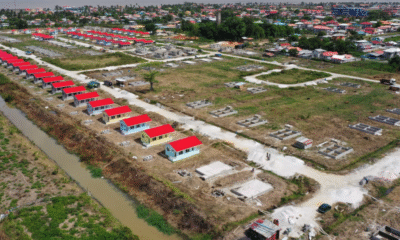- $1.2B Onderneeming Water Treatment Plant commissioned by President Ali
- Third plant to be commissioned under the Coastal Water Treatment Infrastructure Programme (CWTIP).
Guyana, June 4, 2025 – With the commissioning of the massive $1.2 billion Onderneeming Water Treatment Plant in Red Village Onderneeming, Region Two, the Essequibo Coast now enjoys 87 per cent access to clean, treated water — a significant increase from just 40 per cent. His Excellency Dr Mohamed Irfaan Ali joined scores of delighted residents on Friday to commission the new, state of the art, plant that is designed to treat 10 million liters of water per day (MLD). Designed and constructed by Toshiba Water Solutions, it is the third major plant to be commissioned by the government under the Coastal Water Treatment Infrastructure Programme (CWTIP). Some 18,000 persons from villages like Supenaam, Good Hope, Spring Garden, Good Intent, Aurora, Makeshift, Dryshore/ Warousie, Hibernia and Fairfield among others, are being served by the massive plant.
In his feature address before the unveiling of the plaque, President Ali said that a modern Guyana must be built on improved social services like education, health, roads, housing, and especially clean water. The government’s current goal is to ensure that by the end of the decade, all Guyanese, from the coastland to the hinterland, have access to 100 per cent treated water..
“This is what people-centered governance looks like: investing in infrastructure that directly improves people’s lives,” the president underscored.
This includes constructing seven new water treatment plants under the CWTIP programme to eliminate the reddish, metallic water that many residents have endured due to high iron content in groundwater.
“We are not content with just giving you water at the better pressure. We want to give you water that is safe, that is clear, that is drinkable, that is healthy. Water that transforms all the indicators of a healthy and good life,” he affirmed.
Additional Investments
President Ali said the government has invested over $2.5 billion in water infrastructure in Region Two between 2020 and 2025. This includes the newly commissioned water treatment plant. Additional investments include two new wells and expanded access in previously neglected communities along the Pomeroon River, bringing first-time potable water to over 2,500 people.
A second major water treatment plant will be constructed at Mariah’s Delight, addressing the longstanding issue of poor water quality between Walton Hall and Charity. It is scheduled for completion by June 26 and will serve thousands of Essequibo residents. A massive $1 billion investment will be made to make this a reality.
“We are not stopping here. From Mariah’s Delight to the Pomeroon, the transformation continues because the people of Essequibo deserve the very best,” the president declared.
Meanwhile, the Chief Executive Officer (CEO) of the Guyana Water Incorporated (GWI) Shaik Baksh in his remarks said this massive project is a symbol of progress, presence and the people’s power. He attributed the project’s realization to President Ali’s vision and push. He explained that new wells were drilled by Morris Jeffrey and the GWI Well Services team at the WTP compound to supply adequate water for treatment and distribution.
According to him, this will now serve new home owners in the housing scheme currently being developed in this area.
“This is how the Government of Guyana cares for you the people of Essequibo [and] those across the length and breadth of Guyana,” he affirmed.
Residents React To Clean Water
The Department of Public Information (DPI) gathered feedback from Essequibians shortly after the commissioning ceremony, who sang praise to the government for bringing a much-needed relief.
One of them was Nadia Seeram who said the water quality in the past years was poor.
“It was very dirty, smelly [and] red,” she said, adding that, “it destroys the toilet bowl and so. I am very happy now and I would get a lot of savings in my pocket because I don’t have to buy this bright bowl and all the cleaning agents.”
Sandra (only name given) shared similar sentiments. She said, “Everything is so clean; no red water and we are so happy about it.”
Regional Chair Vilma DaSilva also welcomed Onderneeming’s new water treatment plant, describing it as a significant achievement for the region.
“We have lots more to celebrate,” she declared, highlighting the scope of investments and transformation currently underway in Region Two
Project’s background
The Government of Guyana has invested $40 billion to construct seven new large water treatment plants in coastal communities like Onderneeming under the CWTIP programme. The aim is to increase access to treated water by 90 per cent by the end of 2025x,
In addition to new plants, the government is upgrading twelve existing plants and installing 200 kilometre (km) of transmission mains to improve water quality, continuity of service and level of service in Regions Two, Three River, Four, Five and Six. Also, 18 small water treatment plants are also under construction in Regions Two, Four, Five and Six.


 News4 days ago
News4 days ago
 News1 week ago
News1 week ago
 Caribbean News5 days ago
Caribbean News5 days ago
 News4 days ago
News4 days ago























